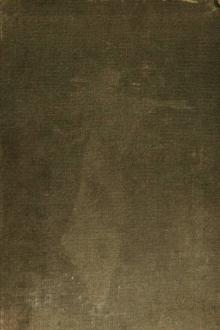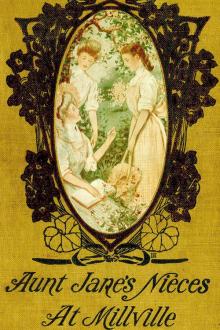Four Ghost Stories by Mrs. Molesworth (big screen ebook reader TXT) 📕

Read free book «Four Ghost Stories by Mrs. Molesworth (big screen ebook reader TXT) 📕» - read online or download for free at americanlibrarybooks.com
- Author: Mrs. Molesworth
- Performer: -
Read book online «Four Ghost Stories by Mrs. Molesworth (big screen ebook reader TXT) 📕». Author - Mrs. Molesworth
"See here," I exclaimed; "here is a lovely cup! Now a service like that would be tempting! Have you more of it?" I inquired of the woman.
She shook her head.
"That is all that remains," she said. "We have never kept it in stock; it is far too expensive. Of course it can be made to order, though it would take some months, and cost a good deal."
"I wish I could order a service of it," I said; but when I heard how much it would probably cost it was my turn to shake my head. "No, I must consider about it," I decided; "but I really have never seen anything prettier. Can I buy this cup?"
The woman hesitated.
"It is the only one left," she said; "but I think—oh yes, I feel sure—we have the pattern among the painting designs. This cup belonged to, or rather was an extra one of, a tea-service made expressly for the Duchess of T——, on her marriage, now some years ago. And it is curious, we sold the other one—there were two too many—to a compatriot of yours (the gracious lady is English?) two or three years ago. He admired them so much, and felt sure his mother would send an order if he took it home to show her. A tall, handsome young man he was. I remember it so well; just about this time of the year, and hot, sultry weather like this. He was travelling on foot—for pleasure, no doubt—for he had quite the air of a milord. And he bought the cup, and took it with him. But he has never written! I made sure he would have done so."
"He did not leave his name or address?" I said; for the world is a small place: it was just possible I might have known him, and the little coincidence would have been curious.
"Oh no," said the woman. "But I have often wondered why he changed his mind. He seemed so sure about sending the order. It was not the price that made him hesitate; but he wished his lady mother to make out the list herself."
"Well, I confess the price does make me hesitate," I said, smiling. "However, if you will let me buy this cup, I have great hopes of proving a better customer than my faithless compatriot."
"I am sure he meant to send the order," said the woman. She spoke quite civilly, but I was not sure that she liked my calling him "faithless."
"It is evident," I said to Frau von Walden, "that the good-looking young Englishman made a great impression on her. I rather think she gave him the fellow cup for nothing."
But after all I had no reason to be jealous, for just then the woman returned, after consulting the manager, to tell me I might have the cup and saucer, and for a less sum than their real worth, seeing that I was taking it, in a sense, as a pattern.
Then she wrapped it up for me, carefully and in several papers, of which the outside one was bright blue; and, very proud of my acquisition, I followed Frau von Walden to the other side of the building containing the workrooms, where we found the two children full of interest about all they had seen.
I should here, perhaps, apologise for entering into so much and apparently trifling detail. But as will, I think, be seen when I have told all I have to tell, it would be difficult to give the main facts fairly, and so as to avoid all danger of any mistaken impression, without relating the whole of the surroundings. If I tried to condense, to pick out the salient points, to enter into no particulars but such as directly and unmistakably lead up to the central interest, I might unintentionally omit what those wiser than I would consider as bearing on it. So, like a patient adjured by his doctor, or a client urged by his lawyer, to tell the whole at the risk of long-windedness, I prefer to run that risk, while claiming my readers' forgiveness for so doing, rather than that of relating my story incompletely.
And what I would here beg to have specially observed is that not one word about the young Englishman had been heard by Nora. She was, in fact, in a distant part of the building at the time the saleswoman was telling us about him. And, furthermore, I am equally certain, and so is Frau von Walden, that neither she nor I, then or afterwards, mentioned the subject to, or in the presence of, the children. I did not show her the cup and saucer, as it would have been a pity to undo its careful wrappings. All she knew about it will be told in due course.
We had delayed longer than we intended at the china manufactory, and in consequence we were somewhat late at the meeting-place—Ulrichsthal. The gentlemen had arrived there quite an hour before; so they had ordered luncheon, or dinner rather, at the inn, and thoroughly explored the ruins. But dinner discussed, and neither Frau von Walden nor I objecting to pipes, our cavaliers were amiably willing to show us all there was to be seen.
The ruins were those of an ancient monastery, one of the most ancient in Germany, I believe. They covered a very large piece of ground, and had they been in somewhat better preservation, they would have greatly impressed us; as it was they were undoubtedly, even to the unlearned in archæological lore, very interesting. The position of the monastery had been well and carefully chosen, for on one side it commanded a view of surpassing beauty over the valley through which we had travelled from Seeberg, while on the other arose still higher ground, richly wooded, for the irrepressible forest here, as it were, broke out again.
"It is a most lovely spot!" I said with some enthusiasm, as we sat in the shade of the ruined cloisters, the sunshine flecking the sward in eccentric patches as it made its way through what had evidently been richly-sculptured windows. "How one wishes it were possible to see it as it must have been—how many?—three or four hundred years ago, I suppose!"
Lutz grunted.
"What did you say, Lutz?" asked his mother.
"Nothing particular," he sighed. "I was only thinking of what I read in the guide-book, that the monastery was destroyed—partly by lightning, I believe, all the same—by order of the authorities, in consequence of the really awful wickedness of the monks who inhabited it. So I am not sure that it would have been a very nice place to visit at the time you speak of, gracious lady, begging your pardon."
"What a pity!" I said, with a little shudder. "I do not like to think of it. And I was going to say how beautiful it must be here in the moonlight! But now that you have disenchanted me, Lutz, I should not like it at all," and I arose as I spoke.
"Why not, mamma?" said Reggie curiously. I had not noticed that he and his sister were listening to us. "They're not here now—not those naughty monks."
"No, of course not," agreed practical Nora. "Mamma only means that it is a pity such a beautiful big house as this must have been had to be pulled down—such a waste when there are so many poor people in the world with miserable, little, stuffy houses, or none at all even! That was what you meant; wasn't it, mamma?"
"It is always a pity—the worst of pities—when people are wicked, wherever they are," I replied.
"But all monks are not bad," remarked Nora consolingly. "Think of the Great St. Bernard ones, with their dogs."
And on Reggie's inquiring mind demanding further particulars on the subject, she walked on with him somewhat in front of the rest of us, a happy little pair in the sunshine.
"Lutz," said his father, "you cannot be too careful what you say before children; they are often shocked or frightened by so little. Though yours are such healthy-minded little people," he added, turning to me, "it is not likely anything undesirable would make any impression on them."
I particularly remember this little incident.
It turned out a long walk to Silberbach, the longest we had yet attempted. Hitherto Herr von Walden had been on known ground, and thoroughly acquainted with the roads, the distances, and all necessary particulars; but it was the first time he had explored beyond Seeberg, and before we had accomplished more than half the journey, he began to feel a little alarm at the information given us by the travellers we came across at long intervals "coming from," not "going to St. Ives!" For the farther we went the greater seemed to be the distance we had to go!
"An hour or thereabouts," grew into "two," or even "three" hours; and at last, on a peculiarly stupid countryman assuring us we would scarcely reach our destination before nightfall, our conductor's patience broke down altogether.
"Idiots!" he exclaimed. "But I cannot stand this any longer. I will hasten on and see for myself; and if, as I expect, we are really not very far from Silberbach, it will be all the better for me to find out the 'Katze,' and see that everything is ready for your arrival."
Frau von Walden seemed a little inclined to protest, but I begged her not to do so, seeing that three able-bodied protectors still remained to us, and that it probably was really tiresome for a remarkably good and trained pedestrian like her husband to have to adapt his vigorous steps to ours. And comfort came from an unexpected quarter. The old peasant woman, strong and muscular as any English labourer, whom we had hired at Seeberg to carry our bags and shawls through the forest, overheard the discussion, and for the first time broke silence to assure "the gracious ladies" that Silberbach was at no great distance; in half an hour or so we should come upon the first of its houses.
"Though as for the 'Katze,'" she added, "that was farther off—at the other end of the village;" and she went on muttering something about "if she had known we were going to the 'Katze,'" which we did not understand, but which afterwards, "being translated," proved to mean that she would have stood out for more pay.
Sure enough, at the end of not more than three-quarters of an hour we came upon one or two outlying houses. Then the trees gradually here grew sparser, and soon ceased, except in occasional patches. It was growing dusk; but as we emerged from the wood we found that we were on a height, the forest road having been a steady, though almost imperceptible, ascent. Far below gleamed already some twinkling cottage lights, and the silvery reflection of a small piece of water.
"To be sure," said young von Trachenfels, "there is a lake at Silberbach. Here we are at last! But where is the 'Katze'?"
He might well ask. Never was there so tantalising a place as Silberbach. Instead of one compact, sensible village, it was more like three or four—nay, five or six—wretched hamlets, each





Comments (0)